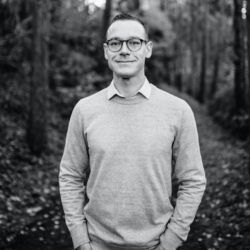The opening film of La Semaine de la Critique (Critics’ Week) at the 2019 Festival de Cannes is a wonderful fable but not quite a parable. The latter is a realistic narrative-metaphor exploring religious ideas via non-religious discourse, while the former is more overtly allegorical, fantastical, and expressionistic. The debut feature film of youthful Moroccan filmmaker Alaa Eddine Aljem, The Unknown Saint (the French title is literally translated “The Miracle of the Unknown Saint”) is striking in its framing of the Moroccan landscape and its inhabitants, a conglomeration of ancient and modern times. The rolling desert hills and the symmetrical still frames have an otherworldly sense to them, as if something miraculous could occur at any moment.
The opening pre-title scene follows a thief (Younes Bouab) as he buries a bag of stolen money at the top of a perfectly-rounded hill. Moments later, he is captured by the police. But since he places stones around the mound, it looks like a lonely grave, and the money remains buried. The ruse works too well; upon release from prison, the thief returns to his buried treasure, only to find a mausoleum built upon it, a sacred shrine devoted to the grave of an unknown saint. An entire village has sprung up around the site, filled with people suffering from ailments who seek restoration from the supposed saint’s healing powers. Unable to obtain his money, the unnamed thief finds himself at the local hostel, repeatedly trying to find a way to overcome the night watchmen and dog who guard the shrine.
While the thief is at the center of the narrative, Aljem weaves a number of different interconnecting stories together, showing us the lives and livelihood of the villagers. Nearby, an aging father and his desperate adult son are at odds over whether or not to leave their parched land due to a 10-year drought. At the same time, a new doctor (Anas El Baz) arrives in the village to “help” the ailments of the community’s elderly women, but who really only use the doctor’s waiting area for socializing; the grumpy nurse (Hassan Ben Badida) befriends the doctor because, as he put it, they’re both just bored. The thief eventually calls a friend, Ahmed the Brain (Salah Ben Saleh), to help him come up with ideas; the “brain” suggests burning the village down entirely and stealing the money while the people freak out. All of these strands come together by the final act in what proves to be a dynamite finale.
Though ostensibly a drama, The Unknown Saint has a droll, whimsical sense of humor about it. There is a barber/dentist who is simply hilarious in his mannerisms, and the guard dog ends up getting fitted with gold teeth. At times, it reminded me of Finnish filmmaker Aki Kaurismäki’s wonderfully weird worlds of quiet corners in urban Helsinki. But instead of the urban working-class, Aljem chooses a natural, brightly-lit landscape for his semi-satirical tale about religious fervor and authentic faith (in this case, Islam). The cinematography often highlights the stark contrast between the dusty earth and the azure skies by placing the camera in just such a way as to create a linear horizon. Some shots look almost two-dimensional, especially of the large hill with the unknown saint atop it silhouetted against the heavens. The score is just barely present, but it emphasizes the emotional beats of the actors as they imbue their characters with a sense of sincerity.
Perhaps my only negative critique is that the light-hearted tone of the fable seems to resist its more serious subject matter, namely the complex and tense relationship between religion and money, spirituality and materialism. Can God work through natural wonders? Is prayer effective, or simply empty motions of tradition? The Brain is worried about the morality of digging up a sacred shrine to a saint, noting that his relatives have experienced healing. The thief has to remind him that there’s no saint actual there; it’s just a bag of money. And besides, the whole religion thing is an antiquated joke, isn’t it? The Unknown Saint doesn’t seek to truly answer such theological questions as much as it simply invites its audience to enter into this tall tale and enjoy the experience.

